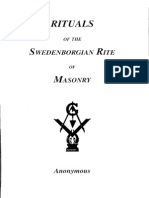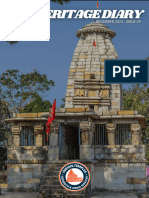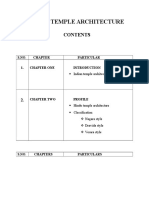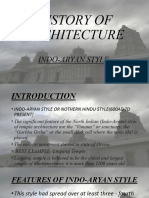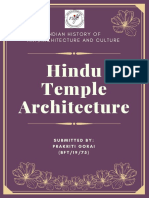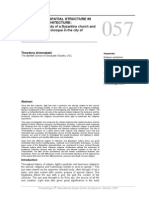Temple Architecture of Jharkhand
Temple Architecture of Jharkhand
Uploaded by
AmitCopyright:
Available Formats
Temple Architecture of Jharkhand
Temple Architecture of Jharkhand
Uploaded by
AmitOriginal Title
Copyright
Available Formats
Share this document
Did you find this document useful?
Is this content inappropriate?
Copyright:
Available Formats
Temple Architecture of Jharkhand
Temple Architecture of Jharkhand
Uploaded by
AmitCopyright:
Available Formats
TEMPLE
ARCHITECTURE
OF
JHARKHAND
0 •••. _ ..•.
'(Fj
o 0
.~~~
t tt~t-
..
Illf\
~I....;'
ARCHAEOLOGICAL SURVEY OF INDIA
RANCHI CIRCLE, RANCHI·834001
Ph. :2331369
From historical fact, the dynasties like the
Nagavanshi, the Cheras, the Rajputs of Singhbhum, the
Dhol Rajputs of Ghatsila, and Rajputs of Manbhum, and
some feudal lords constructed temples for the public and
private worship. However, the neighbourig states like
Orissa and Bengal had its own temple architectural
tradition; so in many ways, the temples of Jharkhand
India has a rich and varied cultural heritage and natural have been influenced by these architectural styles.
treasures of exceptional value. Archaeological Survey of The temples of Jharkhand have been
India (ASI), one of the oldest academic organisations in functioning as religious institutions from yore. The
India is widely acknowledged for its technical expertise group of temples at Maluti in east; Baba Baidyanath
in conserving monuments. It has been entrusted with group of temples, Deoghar in North;, group of temples
the responsibility of protecting monuments and sites, at Doisagarh in west and Lord Jagannath temple in
which range from the prehistoric to the medieval period. Jagannath Pahadi, Ranchi has bestowed religious
ASI, over a passage of time, has extended its movement in different sectrarian points of views.
activities to include exploration/excavations, The first group of temples has followed
development of museums, temples and expeditions. In Orissan style of architecture; basically, the temples of
fact since 1972, the department has been involved in Jharkhand have the main shrine or deul without Mukha
administering the Antiquities and Art Treasures Act, Mandapa. The typical curvilinear sikhara are succeeding
through prevention of smuggling and fraudulent with Bhumi-Amlakas. The Rath's projections are
dealings in antiques. prominent and the exterior wall is carved with
As of today, 17 ancient monuments in India have geometrical design of Chaitya window motif, Bhumi
been declared as World Heritage Sites and inscribed as Amlakas, etc.,whereas the interior is quite plain in
cultural property of mankind by the UNESCO. nature.
The main objective of the ASI, is to explore, find
out and protect India's PAST:Pratnakirttimapavranu.
HARADIH GROUP OF TEMPLES
HARADIH, BUNDU, RANCH I
The Haradih group of Temples (Dist.
Human race is an integral part of nature, and man has
Ranchi). The group of temple is situated 15 KM east of
accommodated himself within it. The natural calamities
Bundu, beside the river Kanchi. This group of temples
like fire, flood, rain, earthquake, etc. has created a fear
belongs to 9th-10th Centuries AD Possibly these temples
in the minds of the primitive men. So they admired the
in Jharkhand closely resemble the evolved group of
power of the nature as a God or super natural spirit, from
Orissan temple architecture. These temples are made
which the belief and thus the totem symbol worship
out of basalt stone. Big temples have niches specified
came into existence. Generally it has got a set-up of
for Parivara Devata; presently only two temples have
beliefs and practices and then the existence of the
survived whereas others are in ruins.
religion got enforced. As abode of this super spirit, the
Devalaya or Temples came into existence.
Devalaya or temple is the place of the God. In
Hindu tradition, devotees build the temple as a mark of
dedication in order to secure merit in this world and the
next. The temple is not a mere house of prayer, but it's a
"Vastupurusa"
Unlike other States the present Jharkhand has
several groups of temples, which spread its religious
aroma and signified its beauty through stones in
ANCIENT SHIVA TEMPLE
geometric and non-geometric carvings, which are KHEKPARTA, LOHARDAGA
indeed a milestone for Jharkhand architectural scenario. The Khekparta Temple (Distt. Lohardaga) is
The development of temple architecture in a pancharatha type, dedicated to Lord Shiva. It has
Jharkhand has three phases which can be divided into medium height with typical Orissan rekha-deul style
three broad groups, i.e., Naqara, Bengal or Hindu decorated with chaitya window or "bhu motif " as
Mughal, and indigenous horizontal tier systems. described in Orissan architectural canon.
ASTHABHUlA DURGA TEMPLE TANGINATH TEMPLE
DEORI, RANCHI GUMLA
The Durga temple of Deori (Distt. Ranchi) is decoration and the lintel has Ganesh figure; both the
another important Orissan style temple, partly sides of door jam Ganga and Yamuna figures are carved
damaged. It is of panchratha in plan and elevation has in well plasticity. The temple and its surrounding
succeeded with Bhumi- Amlaka and chaitya Window antiques are dated back to 7th-12th Centuries AD.
motif design. The temple presiding deity is "Asthabhuja"
Durga, carved in well plasticity. This temple is belonging .. ~
to 11th-12th Centuries AD.
. ,W ~
:'/IIJ
AKHILESHWAR TEMPLE
LOHARDAGA
The main shrine of BhandraTemple, Bhandra
UUP CHUTIA TEMPLE (Distt. Lohardaga) is in Orissan style consisting of high
NIRSA, DHANBAD plinth. The Amlaka is missing. The shrine contains a
The Upp Chutia Group of temples, Nirsa huge Shiva linga of black stone. There are images of
(Distt. Dhanbad) has resemblance with Orissan style. Ganga, Yamuna and one of Narasimha. The plasticity,
Out of this group of temples, two temples are in good grace and beauty of these river Goddesses are superb
preserved condition. All these temples are made out of and can be dated to 11th-12th Centuries AD.
stone. The exterior design, curvilinear sikhara and
pancharatha plan signify Orissan style. The temples
were built during 11th-13th Centuries AD.
lHINlHINI PAHADI TEMPLE
DHANBAD
The lhinjhini Pahadi Temple (Distt.
MAHADANI SHIVA TEMPLE Dhanbad) is another Shiva temple which has
BEDO, RANCHI
curvilinear sikhara type. As Ashlar masonry is used in
The Mahadani Shiva Temple, Bedo (Dist. this temple, the veneering wall may have fallen from its
Ranchi) is another Orissan rekha deul of pancharatha original super structure. The temple entrance is of
style with small porch. The five Bhumi Amlakas in beautiful design. The architectural style and associated
Kanikapaga are succeeding to complete curvilinear material signify that this temple is dated back to 11th -
sikhara. The antarala passage is converted as mukha 12th Centuries AD.
mandapa with slight modification, and its sikhara is
following the pedha deul style. This temple is made out
of laterite stone blocks. The second group of Temples is marked
The Tanginath Temple remains (Dist. with terra cotta plaque decorated profusely of lime
Gumla) are preserved upto Bado portion, Its surkhi. These have close resemblance with Bengal
architectural features like door jams, moulded lower group of temples and Medieval Mughal architecture style
jangha and upper jangha signify the Orissan in Jharkhand. The most of Medieval temples came
architectural style. The door jam is decorated with floral under this group.
TERRACOTTA TEMPLE PANCHMATH
MALUTI, DUMKA NAGAR, GUMLA
The Maluti group of Temples (Distt. Dumka) temple). The temple has three storeys; the sikhara part
fall under the Sikaripara block. The temples are is tomb like structure. The temple has pillared varandah
constructed in different styles with Bengal terracotta with room.
plaque decoration and moulded bricks. The existing
earliest temple bears the date Saka era 1642
(corresponding 1720 AD). The Moulikha temple
belongs to the group of Bengal style temples of Ek-
Bangia "Chala", like a typical Indian hut. There are 72
temples moulded in terracotta plaque, decorated with
the episodes of Ramayana, Mahabharata, Bhagavata
and the songs of lokogatha.
NAM NAGAR TEMPLE
NAM NAGAR, GUMLA
Nam Nagar Temple is of flat roof with pillared
varandah, The sanctum exterior niches has carved
Ganesha figure .Few other temples like panchmath
shiva temple is of Hindu-Mughal architecture. Besides
the sanctum, there are two small chambers, used for
store purposes. The wall is plain lime surkhi plaster;
SHYAMSUNDARPUR TEMPLE sikhara is conical tomb like structure and frontal roof has
CHAKUUA, E. SINGHBHUM two small tombs like structure which resembles a
Shyamsunderpur Temple, Chakulia (Distt. mosque.
East. Singhbhum) is another Bengal Ratna style
terracotta temple. The wide frontal wall is used as
canvas for depicting Krishna Charita, Rasalila and
related Gods and Goddesses figurines. This temple was
built by Dalbhumgarh dynasty in the 17th -18th
centuries AD.
CHUTIA TEMPLE
RANCHI
The Chutia Temple which is very close to
Ranchi city, is another example of Hindu-Mughal
architecture. Raja Pratap Roy built this temple in the
year 1727. This two storey temple is for worshipping
CHITTESWARA TEMPLE
lord Krishna and Rama respectively. This temple is
KAYATHA, HAZARIBAGH made out of stone,
The Chiteswara Temple at Kayatha (Distt The third group of monuments is indigenously
Hazaribagh) is a culmination of Hindu 'and Mughal developed, slightly pyramidal with tier system. This
architecture. The main shrine appears to be of Bengal group of temple is spread specifically in north
style and bears the influence of Mughal plaster, and Jharkhand. This group consists of the Baba Baidyanath
corridors with arches make sure to conclude the dating temples group, Deogarh; the Basukinath group of
of this temple to be of 17th century, . temples, Jarmundi; Pandra goup of temples, Nirsa;
Dhauni Shiva temple, Dumka; and Liloristhan temple,
Doisagarh group of Temples is greatly Katras. This temple group has Nagara style; the
influenced by Mughal architecture. The most Significant elevation is slightly pyramidal with finial, The plan is of
temple of this group is Kapilnath temple (Basukinath slightly cruciform due to Rath's projection.
BABA BAIOYANATH GROUP OF TEMPLES
OEOGARH
The Baba Baidyanath group of Temples
has pyramidal tier sikhara with flat roofed mukha
mandapa. These entire temples are built out of stone
during the 16th-19th Centuries AD. The temple of
Baidyanath is dedicated to the Lord Shiva. A separate
two storeyed building is for Musicans. On the east side
of the northern Varanda of the temple is a masonry vat,
into which flow the water and milk used for the ablution
of the lingam.
PANORA GROUP OF
TEMPLES
ULORI STHAN TEMPLE NIRSA, OHANBAO
KATRAS,OHANBAO
The Shiva Temple at Dhauni is known as
Sumeswaranath dham, but is has a group of three
temples. In the main shrine at the centre of sanctum,
the small linga on the flat surface is fitted in a Yonipith.
Besides the linga, there is a Yakshini image of brass. In
architectural features, the sikhara is the pyramidal with
horizontal rekhas or on tier. The main temple is built of
small sized bricks (Lakhori bricks) with lime mortar.
Baba Kapileswar Dham, Pandra (distt.
Dhanbad) group of temples are in slight curvilinear
sikhra in Bengal style with Horizontal tier. These temples
are built of stone in 12th-13th Centuries AD.
The Liloristhan Temple (Distt. Dhanbad) is
also horizontal tier system with slightly evolved Raths
in pancharatha, whereas the Mukha Mandapa has flat
roof with ornamental pillar and multiple curvilinear
arches.
Apart from the above three groups of temples,
the post British period also followed the same Nagara
style architecture. Last but not least, in the modern
India, Jharkhand has a stone temple - Naulekha temple-
at Deogarh which is artistically and architecturally very
important.
However, apart from tribal culture Jharkhand is
a vast land for art and architecture as it had spread
religious values since 7th-8th Centuries AD .
•••••
You might also like
- Rituals of The Swedenborgian Rite of MasonryDocument96 pagesRituals of The Swedenborgian Rite of Masonrybronxgodzilla100% (7)
- The Sons of MaatDocument38 pagesThe Sons of MaatSon of Rizq100% (6)
- Saturn Symbolism in The Salt Lake TempleDocument16 pagesSaturn Symbolism in The Salt Lake TempleAnthony E. Larson100% (3)
- FDGDFGDocument60 pagesFDGDFGManish BokdiaNo ratings yet
- Heritage Diary Dec 2023Document40 pagesHeritage Diary Dec 2023indiantempleloversNo ratings yet
- The Role of Five Elements of Nature in Temple ArchitectureDocument14 pagesThe Role of Five Elements of Nature in Temple ArchitectureMoideen ShahNo ratings yet
- Prominent Religious Monuments and Sites in Bundelkhand RegionDocument3 pagesProminent Religious Monuments and Sites in Bundelkhand RegionGaurav MishraNo ratings yet
- The Temple Architecture in OdishaDocument4 pagesThe Temple Architecture in Odishasomnathbag021No ratings yet
- Temple ArchitectureDocument28 pagesTemple Architectureakileshmathan2007No ratings yet
- The Jain Temples Research PaperDocument26 pagesThe Jain Temples Research PaperUday DokrasNo ratings yet
- General Introduction To Odishan Temple Architecture: Odisha Review May - 2012Document5 pagesGeneral Introduction To Odishan Temple Architecture: Odisha Review May - 2012Amit Bardhan MohantyNo ratings yet
- Pts4 Indian Temple ArchitectureDocument39 pagesPts4 Indian Temple Architecturechanchal sharmaNo ratings yet
- Indian Temple Architecture: Devanshu .D. Veshviker Roll No. 65 Submitted To-Bharti Teacher Class - 10 - CDocument30 pagesIndian Temple Architecture: Devanshu .D. Veshviker Roll No. 65 Submitted To-Bharti Teacher Class - 10 - CShiwangi NagoriNo ratings yet
- The Jain TemplesDocument26 pagesThe Jain TemplesUday DokrasNo ratings yet
- Lost Temples of KhajurahoDocument48 pagesLost Temples of KhajurahoNoor AfshanNo ratings yet
- History of Architecture CIA 3Document16 pagesHistory of Architecture CIA 3Misha NNo ratings yet
- Jain Cluster at KhajurahoDocument88 pagesJain Cluster at KhajurahoUday DokrasNo ratings yet
- 89 95 PDFDocument7 pages89 95 PDFpsgnanaprakash8686No ratings yet
- The Styles of Temple Architectur EDocument27 pagesThe Styles of Temple Architectur EAnshika sainiNo ratings yet
- Temple ArchitectureDocument12 pagesTemple ArchitecturePrakritiNo ratings yet
- Temples of Odisha-The Geometry of Plan FormDocument5 pagesTemples of Odisha-The Geometry of Plan FormMuskan BatraNo ratings yet
- History of Architecture 3 - Week 10 - LectureDocument21 pagesHistory of Architecture 3 - Week 10 - Lectureaaron carpioNo ratings yet
- Art and Culture CCRT and Other SourcesDocument45 pagesArt and Culture CCRT and Other Sourceslaxmi bhattNo ratings yet
- Art and Architecture: by Group Rachitha, Greeshma, Sherya.J Sherya.RDocument10 pagesArt and Architecture: by Group Rachitha, Greeshma, Sherya.J Sherya.Rmadhu sudhanaNo ratings yet
- 13 - Chapter 4 - 2Document31 pages13 - Chapter 4 - 2AahahaNo ratings yet
- Bapuon and OrissaDocument12 pagesBapuon and OrissaudayNo ratings yet
- 14000-Art-and-Culture-Ch-1Document5 pages14000-Art-and-Culture-Ch-1Priyanka PaulNo ratings yet
- Orissan Temple ArchitectureDocument3 pagesOrissan Temple ArchitectureSivaram Nayak100% (1)
- Dravidian and Indo Aryan StyleDocument6 pagesDravidian and Indo Aryan Stylelavanya100% (1)
- History Project Semester-V: Name: Chaitanya.V.ParteDocument22 pagesHistory Project Semester-V: Name: Chaitanya.V.ParteCRAZY GAMINGNo ratings yet
- Art in EMIDocument21 pagesArt in EMItushar10dec2004No ratings yet
- Influence of Vernacular Architecture in Evolution of Temple Forms of OdishaDocument4 pagesInfluence of Vernacular Architecture in Evolution of Temple Forms of OdishaIJIRSTNo ratings yet
- HarshitDocument2 pagesHarshitnamdevharshit167No ratings yet
- Odisha Review 78Document10 pagesOdisha Review 78Sivaram NayakNo ratings yet
- Indian Temple ArchitectureDocument60 pagesIndian Temple ArchitectureNISHI JAINNo ratings yet
- Temple Architecture in IndiaDocument16 pagesTemple Architecture in IndiaKaamana SahuNo ratings yet
- HOA Module 4.1 HighlightedDocument26 pagesHOA Module 4.1 HighlightedDHEESHNA DILEEP 200545No ratings yet
- Literature Review (Book) Creative WritingDocument5 pagesLiterature Review (Book) Creative WritingYATRI SHAHNo ratings yet
- Odisha Temple ArchitectureDocument2 pagesOdisha Temple ArchitectureYoshowant Purohit100% (1)
- Thesis KhajurahoDocument42 pagesThesis KhajurahoshreyaNo ratings yet
- Lingaraja Temple: Why in NewsDocument3 pagesLingaraja Temple: Why in NewsSejal DsouzaNo ratings yet
- Whole Subsequent of Not Only India Borders". StrongDocument9 pagesWhole Subsequent of Not Only India Borders". StrongAsh ShuklaNo ratings yet
- Magnificient Markanda Group of TemplesDocument3 pagesMagnificient Markanda Group of TemplesAlmighty VegetaNo ratings yet
- Nagara Style of Temple ArchitectureDocument5 pagesNagara Style of Temple ArchitectureZubair AnsariNo ratings yet
- Current Affairs AC - 1710837655Document33 pagesCurrent Affairs AC - 1710837655hrsiemenshrNo ratings yet
- Hindu Temple RailingDocument20 pagesHindu Temple RailingUday DokrasNo ratings yet
- Sun TempleDocument6 pagesSun TempleAashiq MohammedNo ratings yet
- Rameswar Group of Temple BoudDocument17 pagesRameswar Group of Temple BoudS.s. MichaelNo ratings yet
- Indian Architecture ReportDocument10 pagesIndian Architecture ReportKurt ReoterasNo ratings yet
- B1.Evolution of TemplesDocument12 pagesB1.Evolution of TemplesAbhay SharmaNo ratings yet
- Shore Temple of Mamallapuram, IndiaDocument3 pagesShore Temple of Mamallapuram, IndiaCess SoronioNo ratings yet
- Ancient Indian Architecture WordDocument79 pagesAncient Indian Architecture WordNeo OrtalizNo ratings yet
- Heritage Diary Oct 2023Document28 pagesHeritage Diary Oct 2023indiantempleloversNo ratings yet
- Temple ArchDocument6 pagesTemple Archsssuhe vsNo ratings yet
- HoA Pre Indo IslamDocument33 pagesHoA Pre Indo IslamShubhdeep MaityNo ratings yet
- What Are Some Unknown Facts About SrirangamDocument48 pagesWhat Are Some Unknown Facts About SrirangamUday DokrasNo ratings yet
- History of Temples of Historical Places OdishaDocument15 pagesHistory of Temples of Historical Places OdishaRiyaz KhanNo ratings yet
- 2133138-A Review Study On Architecture of Hindu TempleDocument7 pages2133138-A Review Study On Architecture of Hindu TempleAmit KumarNo ratings yet
- IJSDR1901061Document3 pagesIJSDR1901061santoshdvg1997No ratings yet
- The Tantric Triad BookDocument183 pagesThe Tantric Triad BookUday DokrasNo ratings yet
- Famous Temples in Tamil NaduFrom EverandFamous Temples in Tamil NaduRating: 5 out of 5 stars5/5 (1)
- Walters Dissertation 2018Document487 pagesWalters Dissertation 2018yash ganganiNo ratings yet
- Indian Temples A Structural Marvel 217Document13 pagesIndian Temples A Structural Marvel 217vijaydhakre2002No ratings yet
- Rishabh Research ProjectDocument61 pagesRishabh Research Projectrejoyraj49No ratings yet
- Temple Entry Enquiry Committee ReportDocument455 pagesTemple Entry Enquiry Committee ReportSiddalingappa SidramaNo ratings yet
- An Egyptian EndowmentDocument4 pagesAn Egyptian EndowmentJosh Chesnik100% (1)
- Historic Reinterpretation and Conservation of Srirangam TownDocument13 pagesHistoric Reinterpretation and Conservation of Srirangam TownSiva Raman100% (2)
- Light As A Symbol of Sacred ArchitectureDocument11 pagesLight As A Symbol of Sacred Architecturem_popovicNo ratings yet
- CATHOLIC Doctrine & PAGAN SUNGOD DoctrineDocument7 pagesCATHOLIC Doctrine & PAGAN SUNGOD DoctrineNyxstory100% (1)
- Bai Shi CeremonyDocument4 pagesBai Shi CeremonyLaurentiu M.No ratings yet
- Bombay Hindu Places of Public Worship (Entry Authorisations Act (31 of 1956)Document4 pagesBombay Hindu Places of Public Worship (Entry Authorisations Act (31 of 1956)Manaswi KosuriNo ratings yet
- GR 3 - Review 3 - SS - QB - 2023-24Document4 pagesGR 3 - Review 3 - SS - QB - 2023-24prakash.nxtioNo ratings yet
- 50c4b0fc8fb1f - Evs Places of Worship 1 PDFDocument1 page50c4b0fc8fb1f - Evs Places of Worship 1 PDFritikaNo ratings yet
- 8 Karneshwar Nataraja enDocument6 pages8 Karneshwar Nataraja enbutterbeer_88No ratings yet
- Conservation - Initial InspectionDocument2 pagesConservation - Initial InspectionPrashna ShresthaNo ratings yet
- Clay-Sealings From The FayumDocument15 pagesClay-Sealings From The FayumGraham ClaytorNo ratings yet
- Notes On Society and Economy Conditions of The Vijayanagara DynastiesDocument2 pagesNotes On Society and Economy Conditions of The Vijayanagara Dynastiesanima1982No ratings yet
- Hangzhou enDocument8 pagesHangzhou enterabajtNo ratings yet
- Seven Churches 07 Jesus - Message To The Church of Philadelphia (Rev. 3.7-13)Document5 pagesSeven Churches 07 Jesus - Message To The Church of Philadelphia (Rev. 3.7-13)joshan77No ratings yet
- Eb 0129Document240 pagesEb 0129dusandusan7No ratings yet
- FoekemaDocument14 pagesFoekemaUday AgarwalNo ratings yet
- Ausat HoaDocument6 pagesAusat HoacaizenniNo ratings yet
- Unit 4 AgraharamDocument14 pagesUnit 4 Agraharamarchitectfemil6663100% (2)
- Enfroa ReviewerDocument17 pagesEnfroa ReviewerArdy Dela FuenteNo ratings yet
- The Commercialization of The Sacred - The Structural Evolution of Religious Communities in JapanDocument19 pagesThe Commercialization of The Sacred - The Structural Evolution of Religious Communities in JapanALBERT ORLANDO CORTES RODRIGUEZNo ratings yet
- Empire of The Petal Throne The Temple of KaráknDocument7 pagesEmpire of The Petal Throne The Temple of KaráknalfredNo ratings yet
- Lighting and Spatial Structure in Religious Architecture PDFDocument14 pagesLighting and Spatial Structure in Religious Architecture PDFShivansh Singh Gautam100% (1)
